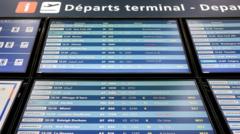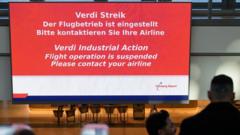Flight attendants at Air Canada have initiated a strike, resulting in the suspension of all airline operations and significant cancellations affecting thousands of passengers. The federal government has intervened to enforce binding arbitration in an effort to resolve the ongoing disagreements over wages and working conditions.
Air Canada Faces Major Disruptions as Flight Attendants Enter Strike

Air Canada Faces Major Disruptions as Flight Attendants Enter Strike
All Air Canada flights have been grounded amid a strike from flight attendants, with government intervention seeking to facilitate negotiations.
As Air Canada faces operational chaos due to a strike by flight attendants, the federal government has stepped in to mitigate widespread disruptions. The strike commenced after attendants issued a 72-hour notice when contract negotiations stalled over key issues including pay and unpaid work hours. Following the strike's initiation at midnight on Saturday, Air Canada halted all flights for its mainline and Rouge services, resulting in the cancellation of over 500 flights, which affects around 100,000 travelers.
The Canadian Union of Public Employees (CUPE), representing 10,000 flight attendants in their negotiations with Air Canada, claimed they had been negotiating in "good faith" for over eight months. While Air Canada proposed a total compensation increase of 38% over four years, CUPE argued that this offer fell short of inflation rates and market standards, effectively resulting in a pay cut for their members.
As a reaction to the strike, Air Canada proceeded with a lock-out notice and quickly began grounding operations. Their Chief Operations Officer, Mark Nasr, elaborated that the airline's operational structure is not as simple as adjusting schedules on short notice.
In an effort to restore operations, the federal government, led by Jobs Minister Patty Hajdu, invoked Section 107 of the Canada Labour Code, mandating both parties to enter binding arbitration to avoid further disruptions to travel and the broader economy. However, CUPE has expressed concerns that government involvement infringes upon their rights and hinders genuine negotiations, suggesting that such measures might procrastinate resolution.
The timeline for a resolution remains uncertain, with echoes of prior Air Canada strikes, such as the 1998 pilots' strike, which lasted 13 days and resulted in considerable financial losses for the airline. In response to ongoing cancellations, Air Canada advises passengers to refrain from heading to airports unless they possess tickets from alternate carriers and ensures customers will receive full refunds for cancelled flights.
As this dispute unfolds, pressure mounts on both the airline and the union to reach a conclusive agreement that avoids further repercussions for travelers and the tourism sector.






















